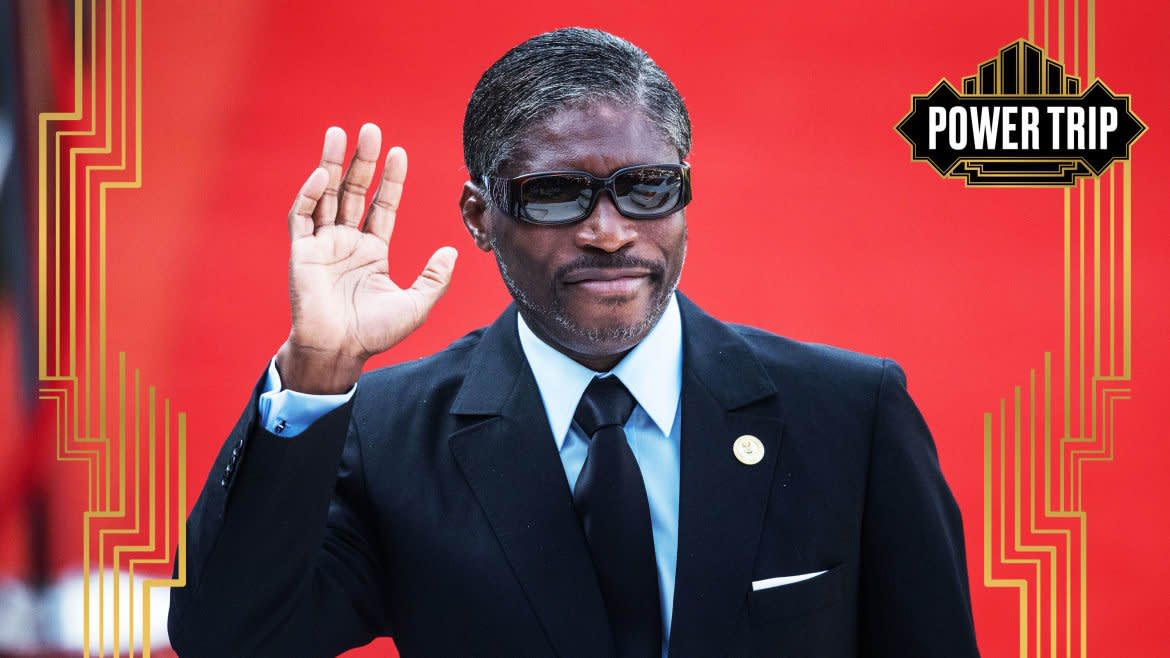Inside a $500 Million Spending Spree by a Dictator’s Son

- Oops!Something went wrong.Please try again later.
Three-fourths of the people in Equatorial Guinea have no internet access, but Teodoro Obiang Mangue isn’t one of them.
The African nation’s vice president—who is the son of the current president—regales his 116,000 Instagram followers with images from his high-flying lifestyle: a ride on a water jetpack, a spin in an F1 race car, a trip to Carnaval. He reportedly has indulged himself with a $100 million mansion in Paris, a $38 million jet, Ferraris, Aston Martins, and a host of Michael Jackson memorabilia, including a “$275,000 crystal-covered glove that Jackson wore on his ‘Bad’ tour.”
Anti-corruption investigators say his profligate spending has been financed with government funds—and it has to stop. This week, the British government sanctioned Obiang over accusations of rampant graft, amid claims that he has improperly spent over $500 million since he became a government minister in 1998. As part of the sanctions, Obiang’s assets will be frozen and he will be banned from entering the U.K.
“The action we have taken today targets individuals who have lined their own pockets at the expense of their citizens,” said foreign minister Dominic Raab in a statement. “Corruption drains the wealth of poorer nations, keeps their people trapped in poverty, and poisons the well of democracy.”
Oligarch Son to Pay Mom $100 Million in World’s Most Expensive Divorce Battle
The government of Equatorial Guinea did not immediately respond to a request for comment, nor did Obiang in a message to his personal Instagram account, though he has previously denied wrongdoing. Online, he is projecting an air of calm. On Friday morning he posted a pair of photos to his Instagram page, perched on the edge of a luxury armchair and grinning in a bright crimson blazer.
Obiang’s penchant for fancy things started young. He reportedly went to a private high school in Normandy, in France, then took English language classes at Pepperdine University, where he traveled around in a limousine and holed up at a rental house in Malibu and at the Beverly Wilshire Hotel, according to a 2007 report in the university’s newspaper. He rarely attended class, the paper said, and he was eventually asked to leave the program early.
Soon after, Obiang entered the Equatorial Guinean government. It was a family affair; Obiang’s father, Teodoro Obiang Nguema Mbasogo, seized power from his uncle in a 1979 coup and has ruled continuously ever since.
It was an auspicious time to join the family trade, as Equatorial Guinea was substantially expanding its oil exploration program. “It was one of the poorest countries when oil was discovered in the '90s, and it was also a country with very little administrative infrastructure,” Sarah Saadoun, a senior researcher at Human Rights Watch, told The Daily Beast. The newfound wealth quickly found its way into the pockets of the president and his inner circle, Saadoun says. “[The younger Obiang] is unique in the shamelessness of how he spends that money.”
Obiang allegedly found other ways to enrich himself, too. While serving as Minister of Agriculture and Forestry, for example, he “instituted a large ‘revolutionary tax’ on timber, but insisted that the payments be made directly to him” or to a company he owned, according to a 2007 memo from the U.S. Department of Justice. (Equatorial Guinea has argued that these actions were legal.)
Obiang’s official government salary at the time was $60,000, the Justice Department reported. Yet between April 2005 and the end of 2006, “at least $73 million was wire transferred to the U.S.” on his behalf and was used to buy a $35 million house in Malibu and a $33.8 million jet.
More legal tumult followed. In 2014, the U.S. government settled corruption allegations against Obiang, and he agreed to forfeit more than $30 million in assets. Three years later, a French court found him guilty (in absentia) of embezzlement, imposed a three-year suspended sentence, and confiscated tens of millions of dollars in holdings. One major point of contention was an enormous mansion in Paris that served as a personal residence for Obiang. The Equatorial Guinean government argued it was a diplomatic outpost, but a United Nations court later overruled that claim.
The Lavish Lives of the Kremlin’s Ultra-Rich Daughters
Meanwhile, in 2018 the government of Brazil reportedly seized roughly $1.5 million in cash and $15 million in watches that Obiang and his delegation brought into the country. (Equatorial Guinea claimed the search was unlawful.) Foreigners could bring up to $2,400 in cash into Brazil, per domestic law; it was not a close call.
As for the United Kingdom, sanctions restrictions are reviewed on an ongoing basis, and at a minimum of every three years. Obiang can also lobby for their removal.
The legal trouble has shined a light on extreme wealth inequality in Equatorial Guinea. It’s the third-richest country in Africa, measured by gross domestic product per capita. At the same time, according to World Bank data, a third of the population lacks basic sanitation services.
For global governments, the challenge will be reappropriating funds and ensuring it isn’t simply siphoned anew. When the government of Switzerland auctioned off $27 million of Obiang’s cars in 2019, the most valuable among them, a Koenigsegg One:1, reportedly found its way back into his collection.
Got a tip? Send it to The Daily Beast here
Get our top stories in your inbox every day. Sign up now!
Daily Beast Membership: Beast Inside goes deeper on the stories that matter to you. Learn more.

